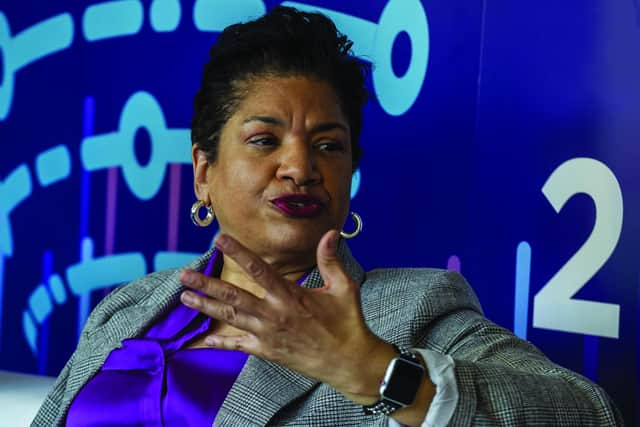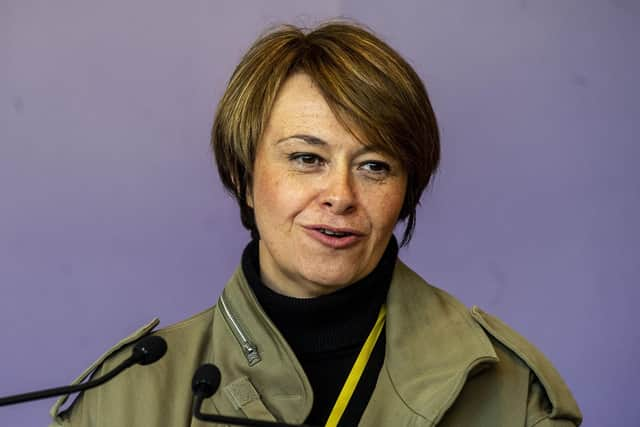Conference report: Figuring out fairer finance
“Banking used to be monocultural – an account was tied to a job and salary. You had to fit in; there was a single, similar archetype,” said Dame Julia Unwin.
“That’s changed as we earn, save and borrow in much more diverse ways. The power of data has allowed that to be different, but I don’t think the public has registered what that means and what the risks and opportunities are.”
Advertisement
Hide AdAdvertisement
Hide AdSmart Data Foundry is an organisation born at the University of Edinburgh which aims to unlock the power of financial data to improve people’s lives.


Unwin, a former chief executive at the Joseph Rowntree Foundation, said that until recently there has been a heavy reliance on “old and backward-looking” government data. “Now we have the opportunity to see in real time how people are doing things.
“The Bank of England said the work we did during the Covid-19 pandemic, to look how a large group of people were earning, saving and borrowing [in an anonymised way], created data they had not seen before.”
Deborah Womack, a partner with global law firm EY, told the conference that financial data was still being used in a very “flat” way and had much greater potential. “How can data help us deliver a fairer financial future if we collect it in the same way we always have?’ she asked. “New types of data [such as biodemographic and behavioural data] have the potential to change the way we think about financial services today.”
David Goodbrand, a partner with legal firm Burness Paull, said financial data had the potential to be “a real asset if used in an appropriate way”. He said the problems of the financial world were well-known – people were not saving enough, or paying enough into their pensions, and young workers were struggling to get on the mortgage ladder.


However, he warned that consumers had to be informed and involved: “If data is not used in a fair and transparent way, and consumers are not brought along, an asset can turn into a liability. Trust is vital if we are to use data for a fairer financial world.”
Unwin backed up this point: “If the use of data is over-controlling, and people think it is just about marketing and advertising, they will withdraw their trust.
“People want to see data used to drive innovation to tackle their specific financial circumstances – if they see no benefits, they will ask ‘Why have you taken all this data, and I have nothing?’”
Advertisement
Hide AdAdvertisement
Hide AdWomack stressed that financial institutions could use data to deliver fairer futures for small businesses, as well as individual customers.


She quoted an EY survey which asked small to medium-sized enterprises (SMEs) what they wanted from the use of financial data and technology. The SMEs reponded:
- To better understand my business.
- To offer me products and services that make sense to my business at its stage of development.
- To help me get better access to cash and credit to grow my business.
- To provide information and intelligence to shape the future of the business.
Goodbrand said open banking – allowing financial data to be shared with third-party providers to benefit consumers – has been a “tremendous success”. He added: “It showed that rather than banks owning data, you [consumers] owned that data.”
He identified the opportunity to develop into open finance, where a wider range of financial data could be provided to help personalise mortgages, pensions and insurance products.
Looking to the future, Unwin said the Covid-19 work had “given insights into what was happening [with people’s finances] at a time of unprecedented chaos”.
Advertisement
Hide AdAdvertisement
Hide AdShe added: “We have a duty to understand what happens in people’s lives [using financial data] to help us understand where to intervene – without interfering with their privacy.”
The key is to look at data from the perspective of public good, she said, adding: “If the public withdraws consent, we are in trouble.”
Womack agreed, saying the financial sector had to “proactively educate consumers on the two-way data exchange”– the fact that by sharing their financial data, they could reap very significant benefits
Nicola Anderson, chief executive of FinTech Scotland, who chaired the session, summarised: “We have to move beyond the flat data, and we all have a responsibility – it’s not just one part of the industry. We need to put people at the centre of innovation, which needs to focus on outcomes. We have to be thoughtful about bias, we need to educate – and through responsible innovation, we can absolutely drive change for a fairer financial world.”